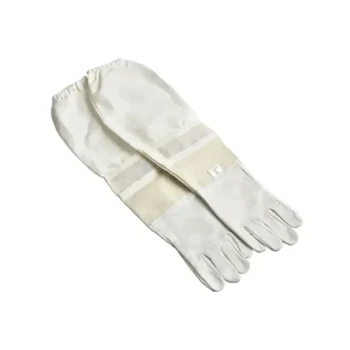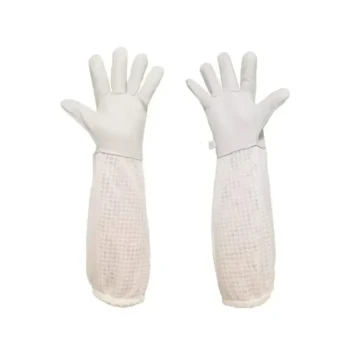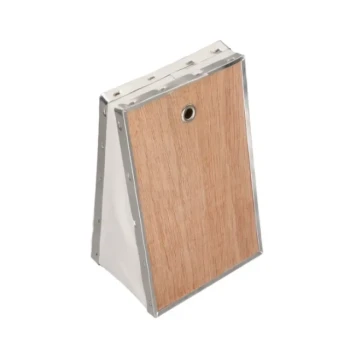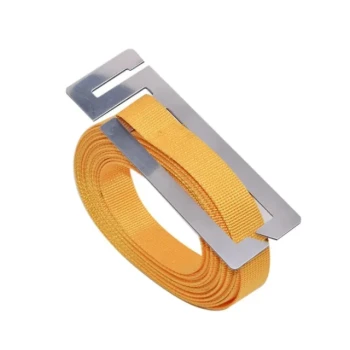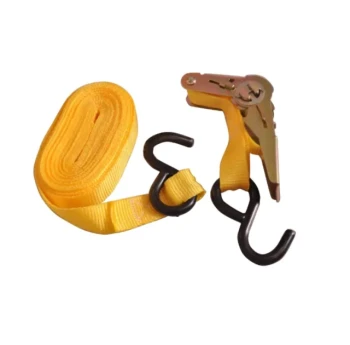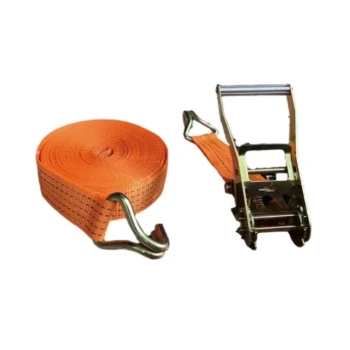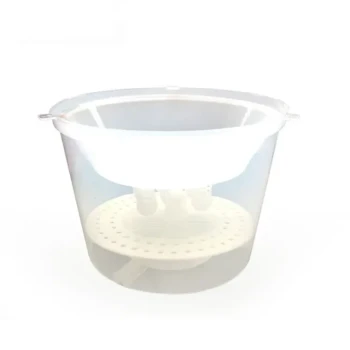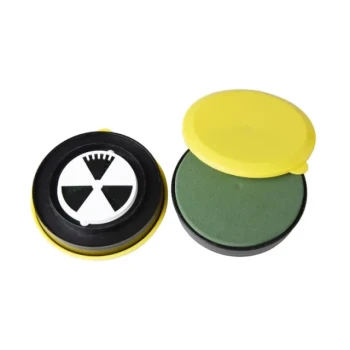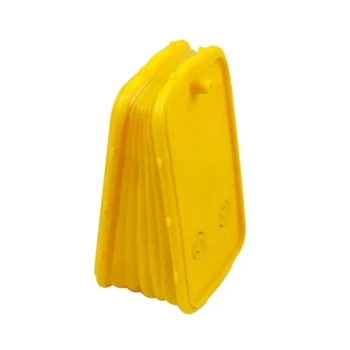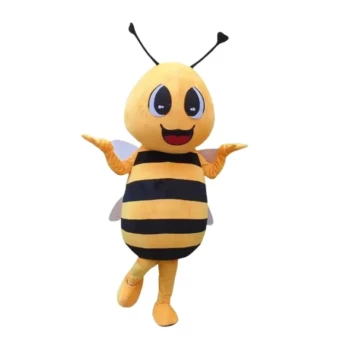At its core, the importance of protective gloves in beekeeping is straightforward: they are your primary defense against painful stings on your hands and arms. This protection allows you to work with confidence and focus, transforming a potentially stressful interaction into a productive and enjoyable one. Without them, the constant threat of being stung can make effective hive management nearly impossible.
The true value of beekeeping gloves isn't just preventing pain. It's about empowering you to be a calm, confident, and gentle beekeeper, which creates a safer and more stable environment for both you and your bees.
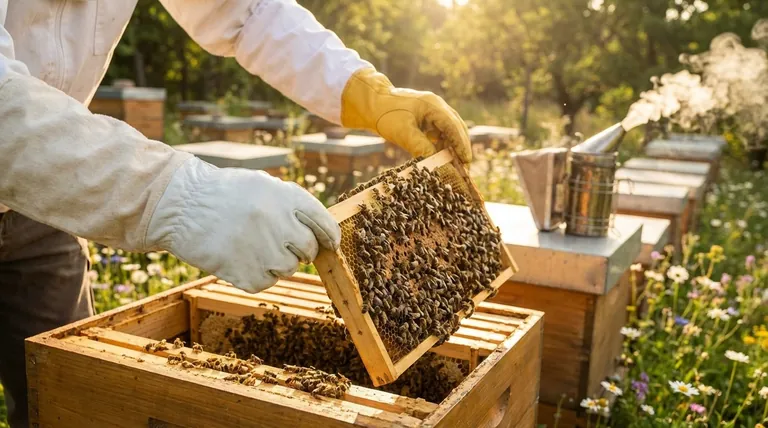
The Primary Role of Gloves: Your First Line of Defense
Protective gear is the foundation of safe beekeeping, and gloves are a non-negotiable component. They serve as a physical barrier that has profound psychological and practical benefits.
Preventing Stings to Build Confidence
Bees sting when they feel threatened, often reacting to sudden, jerky movements. A beekeeper who fears being stung is more likely to make these kinds of movements, which in turn agitates the hive.
Wearing durable gloves removes this fear. This allows you to handle frames and equipment with smooth, deliberate motions, which is essential for keeping the colony calm.
Maintaining a Clean Hive
Beyond sting protection, gloves play a role in apiary hygiene. They help prevent the transfer of dirt, oils, or other contaminants from your hands into the hive.
This simple barrier helps protect the colony and ensures the honey remains pure.
Choosing the Right Glove Material
Not all gloves are created equal. The material directly impacts your level of protection, dexterity, and comfort.
Leather and Goatskin: The Gold Standard
Gloves made from thick, durable materials like leather or goatskin offer the highest level of sting protection. They are the most common and recommended choice, especially for beginners.
Goatskin is often preferred as it tends to be more supple than cowhide, offering a better balance of protection and dexterity.
Ventilated Gloves: Protection with Comfort
For beekeepers working in hot climates, ventilated gloves are an excellent option. These typically feature leather hands combined with ventilated fabric sleeves that extend up the arm.
This design provides airflow to keep you cool without compromising protection where it matters most.
What to Avoid: Insufficient Materials
Thin, cheap materials are a common mistake for new beekeepers. Thin cotton gloves are not sufficient and will result in stings.
Always invest in gloves specifically designed for beekeeping to ensure the material is thick enough to prevent a bee's stinger from penetrating.
Understanding the Trade-offs: Protection vs. Dexterity
Choosing a glove is a balance. The thickest, most protective gloves are often the most cumbersome, reducing your ability to perform delicate tasks.
The Dexterity Challenge
Thick leather gloves can make it difficult to feel what you are doing. Picking up a queen, inspecting individual cells, or manipulating frames requires a degree of sensitivity.
This is the central trade-off: what you gain in protection, you often lose in tactile feedback and fine motor control.
The Critical Importance of Fit
A proper fit can mitigate many dexterity issues. Your gloves should be snug, but not tight.
Gloves that are too large will be clumsy and catch on equipment, while gloves that are too tight will restrict movement and can stretch the material, making it easier for stingers to penetrate. Full coverage up the forearm is also essential.
Evolving Your Glove Choice
Many beginners start with the thickest leather gloves for maximum confidence. As you gain experience and become more comfortable handling bees gently, you may find you can move to a thinner, more flexible goatskin glove.
Some highly experienced beekeepers even work with disposable nitrile gloves, prioritizing dexterity above all. However, this is only recommended after years of experience.
Making the Right Choice for Your Apiary
Your ideal glove depends on your experience level, climate, and personal comfort.
- If your primary focus is maximum safety as a beginner: Choose a pair of high-quality, full-length leather or goatskin gloves that fit you snugly.
- If your primary focus is dexterity for delicate tasks: Consider a thinner goatskin model or, if you are very experienced, using nitrile gloves over a thin base layer.
- If your primary focus is comfort in hot weather: Seek out a ventilated glove that combines a durable leather hand with a breathable fabric sleeve.
Ultimately, the right gloves are a tool that allows you to focus entirely on the health and care of your bees.
Summary Table:
| Key Factor | Why It Matters | Best Choice For |
|---|---|---|
| Material | Determines sting protection, durability, and comfort. | Leather/Goatskin: Maximum protection. Ventilated: Hot climates. |
| Fit | Affects dexterity and safety; too loose or tight is a risk. | Snug fit that allows for movement without being restrictive. |
| Dexterity vs. Protection | Thicker gloves offer more safety but less tactile feel. | Beginners: Prioritize protection. Experts: Can opt for more dexterity. |
Equip your apiary with confidence. HONESTBEE supplies durable, well-fitting beekeeping gloves and protective equipment to commercial apiaries and distributors through our wholesale-focused operations. Ensure your team's safety and efficiency with gear built for the pros. Contact HONESTBEE today to discuss your wholesale needs.
Visual Guide
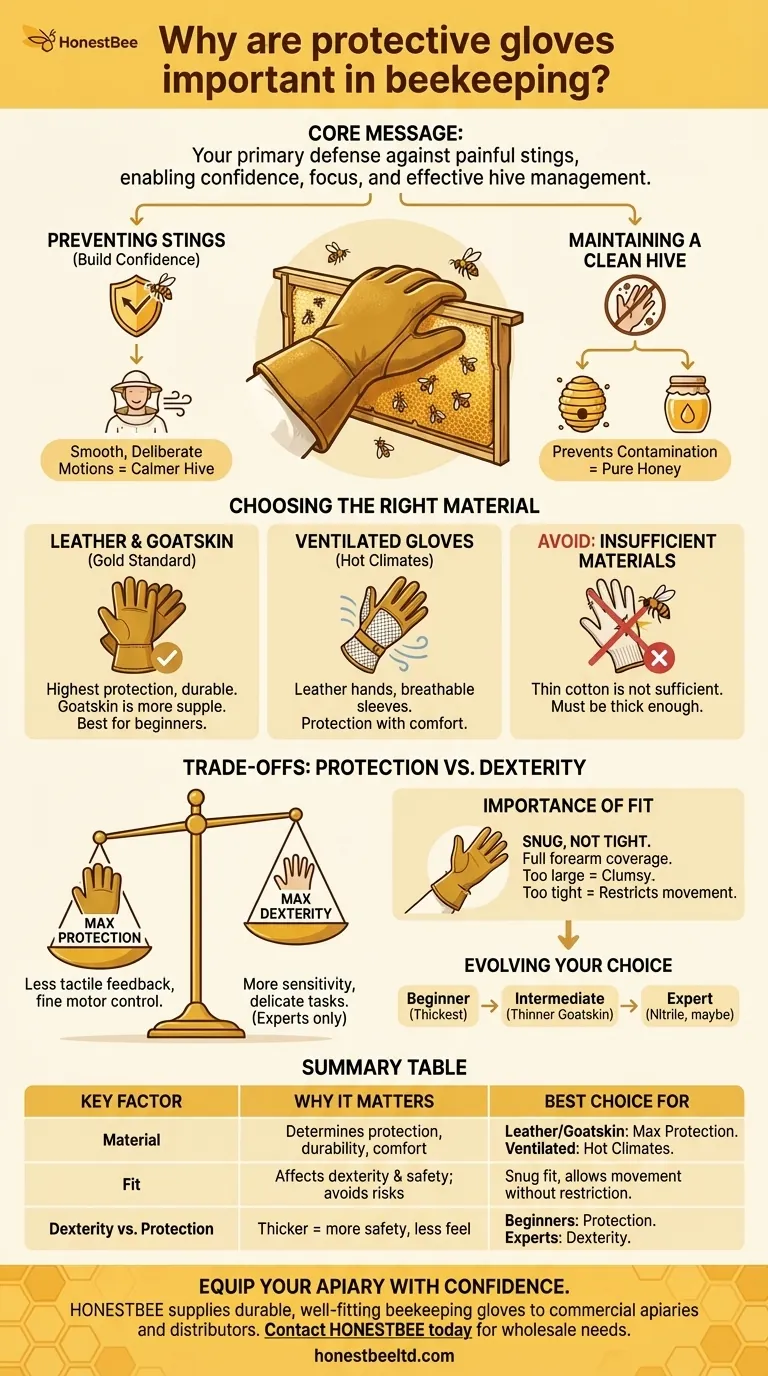
Related Products
- Beekeeping Gloves Goatskin Leather with Long Cotton Sleeve for Beekeepers
- Goatskin Leather Beekeeper Gloves with Vent Long Sleeve for Beekeeping Honey Bee Sting Proof Protection
- Premium Ventilated Goatskin Beekeeping Gloves with Full 3-Layer Mesh Sleeve
- Goat Skin Leather Bee Sting Proof Beekeeping Gloves with Canvas Sleeve
- Professional Galvanized Hive Strap with Secure Locking Buckle for Beekeeping
People Also Ask
- What might experienced beekeepers prefer regarding gloves? Prioritizing Dexterity Over Protection
- What are the steps to clean cow leather beekeeping gloves? Protect Your Investment & Hive Health
- Is it recommended to use a washing machine to clean beekeeping gloves? Protect Your Investment with Proper Care
- Why is it important to clean beekeeping gloves regularly? A Guide to Hive Health & Safety
- Why is a snug fit important for beekeeping gloves? Ensure Dexterity and Bee Safety

